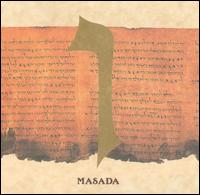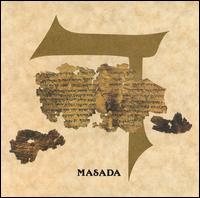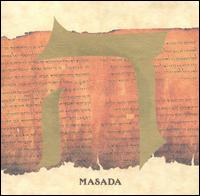
Bar Kokhba is a double album by John Zorn, recorded between 1994 and 1996. It features music from Zorn's Masada project, rearranged for small ensembles. It also features the original soundtrack from The Art of Remembrance – Simon Wiesenthal, a film by Hannah Heer and Werner Schmiedel (1994–95).

John Zorn is an American composer, conductor, saxophonist, arranger, multi-instrumentalist, producer and dedicated improviser that deliberately resists category. Zorn's avant-garde and experimental approaches to composition and improvisation are inclusive of jazz, rock, hardcore, classical, contemporary, surf, metal, soundtrack, ambient, and world music. In 2013, Down Beat described Zorn as "one of our most important composers" and in 2020 Rolling Stone noted "Though Zorn has operated almost entirely outside the mainstream, he’s gradually asserted himself as one of the most influential musicians of our time".

Masada: Alef, also known as Masada 1, is a 1994 album by American jazz composer and saxophonist John Zorn featuring the Masada Quartet performing compositions inspired by Zorn's examination of Jewish culture. It was the first album in a project that has included ten studio albums, concerts, and live recordings.

Masada: Vav, also known as Masada 6, is a 1995 album by American jazz composer and saxophonist John Zorn released on the Japanese DIW label. It is the sixth album in the Masada project.

Masada Anniversary Edition Vol. 1: Masada Guitars is the first album in a series of five releases celebrating the 10th anniversary of John Zorn's Masada songbook project.

The Circle Maker is a double album by John Zorn featuring Zorn's Masada compositions performed by the Masada String Trio and the Bar Kokhba Sextet which was released in 1998 on the Tzadik label.

Live at Tonic 2001 is a double album by Masada featuring two sets recorded live at Tonic during one evening in New York's Lower East Side.

The Classic Guide to Strategy is a compilation album by John Zorn featuring his two early solo records The Classic Guide to Strategy Volume One (1983), (tracks 1-2) and the Classic Guide to Strategy Volume Two (1986), (tracks 3-8). The albums were first released on vinyl on Lumina Records in and later re-released on Tzadik Records in 1996 as a single CD. The second track is inspired by the work of Carl Stalling and tracks 3-8 are named after avant-garde Japanese artists. The Classic Guide to Strategy Volume Two also contained the track "Yano Akiko" (5:20) which does not appear on the CD re-release.

Masada: Beit, also known as Masada 2, is a 1995 album by American jazz composer and saxophonist John Zorn. It is the second album of Masada recordings.

Masada: Dalet, also known as Masada 4, is a 1995 EP by American composer and saxophonist John Zorn. It is the fourth album of Masada recordings. The original pressing of this album was never available for retail sale as it was given away by DIW in exchange of the proof of buying the first three Masada albums up to June 1995. It was reissued in 1997 as a regular release.

Masada: Hei, also known as Masada 5, is a 1995 album by American composer and saxophonist John Zorn. It is the fifth album of Masada recordings.

Live in Sevilla 2000 is a live album by Masada recorded in Seville, Spain.

Live in Jerusalem 1994 is a live album by John Zorn's Masada recorded at the Jerusalem Festival in 1994.

Live in Taipei is a double live album by John Zorn's Masada recorded at the Crown Theatre in Taiwan's capital city Taipei. The album is mistakenly dated 1995, while the performance was actually taken place in 1996.

Sanhedrin 1994–1997 is a 2005 double album by John Zorn's Masada featuring previously unreleased studio recordings.

Masada Anniversary Edition Vol. 4: Masada Recital is the fourth album in a series of five releases celebrating the 10th anniversary of John Zorn's Masada songbook project. It features 12 Masada songs performed by Sylvie Courvoisier on piano and Mark Feldman on violin. It was released in 2004 on Zorn's Tzadik Records as part of the Radical Jewish Culture Series.

Azazel: Book of Angels Volume 2 is an album by the Masada String Trio performing compositions from John Zorn's second Masada book, "The Book of Angels".

Moloch: Book of Angels Volume 6 is an album by Uri Caine performing compositions from John Zorn's second Masada book, "The Book of Angels".

Masada Anniversary Edition Volume 2: Voices in the Wilderness is the second album in a series of five releases celebrating the 10th anniversary of John Zorn's Masada songbook project. It features 24 compositions by Zorn, each performed by different ensembles.

Stolas: Book of Angels Volume 12 is an album by the Masada Quintet featuring Joe Lovano performing compositions from John Zorn's Masada Book Two. This is the first known recording by the Masada Quintet.




















